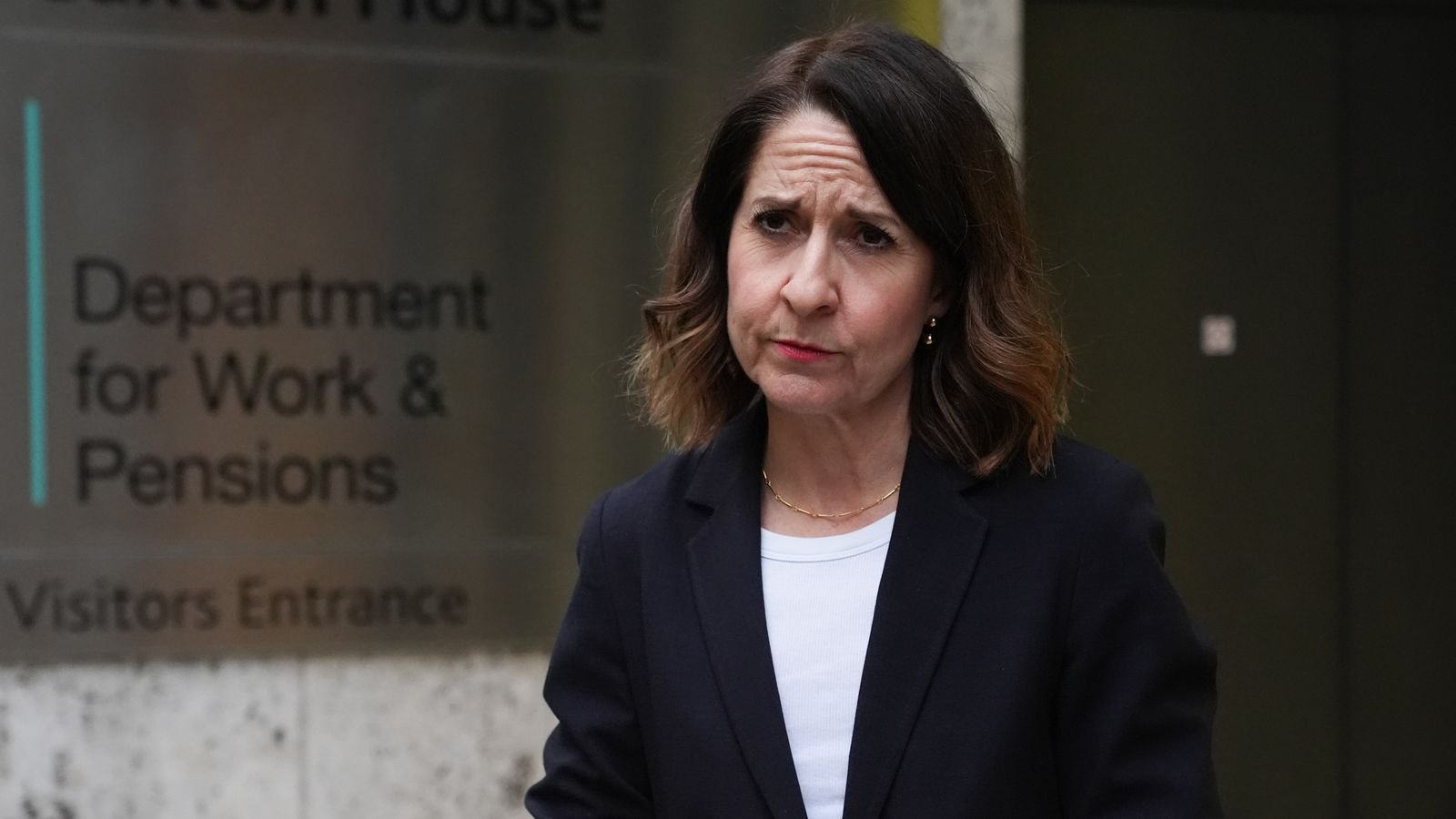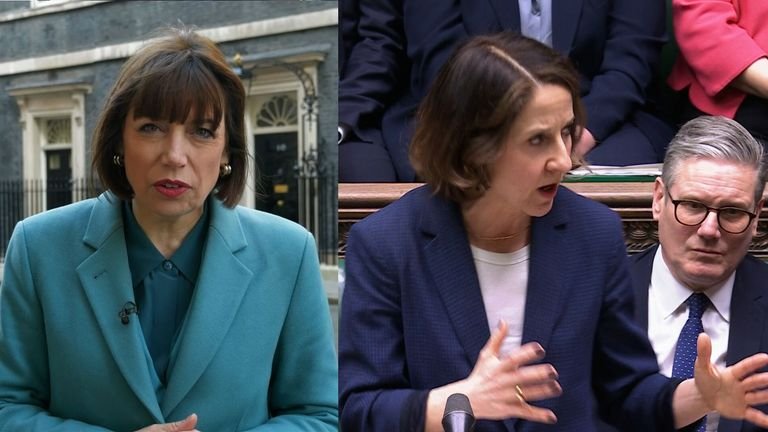The government has informed MPs that it will not retract its controversial reforms to disability benefits, which are scheduled to be presented to parliament later this month.
Over 100 Labour MPs are believed to have reservations about the proposals to reduce almost £5bn from the welfare budget by limiting personal independence payments (PIP) and the health top-up to Universal Credit.
Charities warn that these changes will have a «catastrophic» impact on vulnerable individuals.
Politics Hub: Stay updated with the latest news
The chair of the Commons’ Work and Pensions Committee sent a letter to the secretary of state, Liz Kendall, last month, urging the government to postpone the changes until a comprehensive assessment is conducted on the impact on employment, poverty, and health.
Labour MP Debbie Abrahams stated that while there is a need for reform in disability benefits, «the evidence suggests that these changes may not improve outcomes for most claimants, but instead push many further into poverty and away from the labor market.»
‘Reforms are necessary now’
However, Ms. Kendall responded in a public letter on Wednesday, rejecting the proposal because final approval from parliament is required in November for the changes to be implemented in 2026.
She wrote: «We urgently need to take action to assist those who can work in finding employment.» With one in eight young people currently not in education, employment, or training, and almost 2.8 million individuals out of work due to long-term sickness, along with a projected additional £18bn in spending on health and disability benefits, it is imperative that we change direction.
«We have consistently made it clear that we are not seeking input on every proposal. Instead, Parliament will have the chance to thoroughly discuss, suggest amendments to, and vote on areas where urgent reforms have been announced without consultation. With the PIP caseload and costs expected to continue rising, immediate reforms are necessary to ensure the sustainability of the system while still supporting those with the most critical needs.»
The government’s plan involves addressing the significant increase in PIP caseload, from 15,000 new claims per month in 2019 to 34,000, by requiring claimants to achieve four out of eight points in their assessment to qualify for the benefit. This will result in approximately 370,000 existing claimants losing out upon reassessment. Additionally, measures will be taken to address the «perverse incentive» to claim the health top-up for Universal Credit by freezing it at £97 a week for current claimants and reducing it to £50 a week for new claimants, leading to an average benefit loss of £1,700 per year for around three million individuals.
Claimants with the most severe conditions, who are deemed permanently unable to work, will be exempt from reassessment, providing them with peace of mind. The government will also allocate £1 billion for targeted support programs aimed at assisting disabled individuals in finding employment. However, it is estimated that only around 70,000 people will benefit from these reforms. Ms. Kendall mentioned that a minister in her department is in discussions with disabled individuals and organizations regarding the PIP assessment process. She emphasized the need for urgent changes to the PIP eligibility criteria, even though the review process will take time. The first minister of Wales, Eluned Morgan, expressed her concerns about the impact of these reforms on the people of Wales, as more individuals in Wales are expected to be affected by PIP than in any other part of the country. Despite the need for welfare reform, she highlighted the importance of providing support to individuals to help them find employment. Labour MP Richard Burgon, who opposes the reforms, described the news as «deeply disappointing» for all the MPs who have been pushing for a delay in the decision.
Instead of allowing time for proper scrutiny and meaningful dialogue with disabled people, the government has brushed aside MPs’ genuine concerns.
«These planned disability cuts should be scrapped – not rushed through without proper scrutiny.»
The government has told MPs it will not back down from its controversial reforms to disability benefits, which are set to be introduced to parliament later this month.
More than 100 Labour MPs are thought to have concerns about the plans to cut nearly £5bn from the welfare bill by restricting personal independence payments (PIP) and the health top-up to Universal Credit.
Charities say the changes will have a «catastrophic» effect on vulnerable people.
Politics Hub: Follow the latest updates
The chair of the Commons’ Work and Pensions Committee wrote to the secretary of state, Liz Kendall, last month, calling on the government to delay the changes until a full assessment is carried out of the impact on employment, poverty and health.
Labour MP Debbie Abrahams wrote that while there was a case for reform to disability benefits, «the evidence indicated [these changes] might not improve outcomes for most claimants, but instead push many into poverty and further away from the labour market».
‘Reforms are needed now’
But Ms Kendall has written back, in a letter made public on Wednesday, to reject the idea because the bill needs final approval from parliament in November in order for the changes to take effect in 2026.
She wrote: «We need urgent action to help people who can work, into work. With one in eight young people currently not in education, employment, or training and nearly 2.8 million individuals out of work due to long-term sickness, along with an expected increase of £18bn in spending on health and disability benefits, it is evident that a change in direction is necessary.
The government has made it clear that not every proposal is up for consultation. Instead, parliament will have the opportunity to thoroughly discuss, suggest amendments to, and vote on urgent reforms that do not require consultation. The rise in PIP caseload and costs necessitates immediate reforms to ensure the system’s sustainability while still supporting those with the most pressing needs.
The government’s plan involves doubling the PIP caseload from 15,000 new claims per month in 2019 to 34,000, with claimants needing to score four out of eight points in their assessment to qualify for the benefit. Around 370,000 existing claimants are expected to lose out upon reassessment. Additionally, there will be changes to the health top-up for Universal Credit, freezing it at £97 a week for current claimants and reducing it to £50 a week for new claimants, resulting in an average annual benefit loss of £1,700 for approximately three million individuals.
Claimants with severe conditions deemed unable to work permanently will not undergo reassessment, providing them with peace of mind. The government will allocate £1bn towards targeted support programs aimed at assisting disabled individuals in finding employment.
SOURCE


